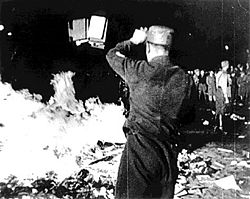Difference between revisions of "Template: Popular article 10 8" - New World Encyclopedia
From New World Encyclopedia
| (2 intermediate revisions by the same user not shown) | |||
| Line 1: | Line 1: | ||
{{Main page article box| | {{Main page article box| | ||
type=Popular| | type=Popular| | ||
| − | title= | + | title=Censorship| |
| − | image_name= | + | image_name=1933-may-10-berlin-book-burning.JPG| |
| − | image_desc= | + | image_desc=Book burning in 1933 in Berlin, Germany| |
| − | text= | + | text='''Censorship''' is the editing, removing, or otherwise changing [[speech]] and other forms of human expression. In some cases, it is exercised by [[government|governing bodies]] but it is always and continuously carried out by the [[mass media]]. It most formally involves the suppression of ideas by [[crime|criminalizing]] or regulating expression. What is censored may range from specific words to entire concepts. The most common reasons for censoring ("omitting") information are the particular interests of the distribution companies of news and entertainment, their owners, and their commercial and political connections. }} |
| − | |||
| − | |||
| − | }} | ||
Latest revision as of 20:38, 23 April 2022
Popular Article: Censorship
Censorship is the editing, removing, or otherwise changing speech and other forms of human expression. In some cases, it is exercised by governing bodies but it is always and continuously carried out by the mass media. It most formally involves the suppression of ideas by criminalizing or regulating expression. What is censored may range from specific words to entire concepts. The most common reasons for censoring ("omitting") information are the particular interests of the distribution companies of news and entertainment, their owners, and their commercial and political connections.
